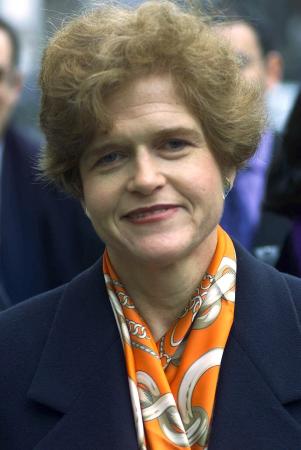| Thursday, January 27,
2005 Witnesses
for the witnesses by Deborah E.
Lipstadt 60 years after
Auschwitz  ATLANTA
-- When I teach my courses
on the history of the Holocaust, I have
learned that for the students the
"highlight" is when they hear about the
Holocaust in the first person singular --
from a survivor, particularly a survivor
of Auschwitz
or one of the other camps. However, the
number of survivors I can call on to speak
to my students is rapidly
diminishing. ATLANTA
-- When I teach my courses
on the history of the Holocaust, I have
learned that for the students the
"highlight" is when they hear about the
Holocaust in the first person singular --
from a survivor, particularly a survivor
of Auschwitz
or one of the other camps. However, the
number of survivors I can call on to speak
to my students is rapidly
diminishing.
The commemoration of the 60th
anniversary of the liberation of
Auschwitz, which is being held on
Thursday, is the last commemoration (they
are held every 10 years) at which a
significant number of survivors of the
camp will be present. I will be there, not
as a survivor or a child of survivors -- I
am neither -- but as a historian of this
place and the other attendant horrors of
that which has become known as the
Holocaust. On some level, this reflects the
passing of the memory torch from the
survivors to historians and scholars. I
already witnessed the beginning of this
process during my libel trial in London in
2000, when I was forced to defend myself
against a Holocaust denier, David
Irving. Irving had called the
Holocaust a "legend," denied that gas
chambers were used to systematically kill
Jews, and removed all mention of the
Holocaust from one his books because, he
said, "if something didn't happen, then
you don't even dignify it with a
footnote." Nonetheless, he sued
me for libel for having called him a
denier. My legal team decided not to call
survivors as witnesses. Irving was acting
as his own lawyer, and they feared that
his only objective would be to humiliate
and confuse these elderly people. More
important, they did not think we needed
witnesses of fact to prove that the
Holocaust happened.We relied instead, on a stellar
team of historians and specialists.
They became, in the words of the poet
Paul Celan, the "witnesses for the
witnesses." This phrase took on life for me one day
when an elderly woman broke through a
phalanx of reporters who were trying to
ask me questions. She rolled up her
sleeve, pointed at the number on her arm
and declared, "You are fighting for us."
On other occasions survivors would wait in
the hallway outside the courtroom and
press into my hands pieces of paper with
the names of their relatives on them.
"This is the evidence," they would tell
me. Ultimately we won a unequivocal victory
with the judge declaring it
"incontrovertible that Irving qualifies as
a Holocaust denier." The judge's choice of
words to describe Irving's writings about
the Holocaust were unambiguous:
"distorts," "perverts," "unjustified,"
"travesty" and "unreal." Deniers like Irving have made Auschwitz
the focus of their attacks because it is
the primary symbol of the Holocaust. But
they have made few significant inroads.
Holocaust denial is hardly a clear and
present danger. But deniers are sure to
try to ply their wares even more
energetically when there is no one left to
say: "This is my story. This is what
happened to me." Then it will be up to those who study
Auschwitz and all the other elements of
the Holocaust to help us know, beyond any
doubt, what happened in these places.
Holocaust historians, as well as those of
other genocides, such as those in Rwanda
and Sudan, bear a particular
responsibility to be not just meticulous
and exacting historians, but "witnesses
for the witnesses." It is a heavy burden, but it can be
done.  Deborah
E. Lipstadt teaches at Emory University
in Atlanta. She is the author of
''History on Trial: My Day in Court
With David Irving'' and a member of the
official American delegation to the
ceremonies marking the 60th anniversary
of the liberation of Auschwitz. Copyright © 2005 The
International Herald Tribune Illustration:
Hotdogs are served outside the great
tourist attraction, the Holocausts Museum
in Washinton DC

Related
items on this website: Dossier
on Deborah Lipstadt Dossier
on Deborah Lipstadt Lipstadt
trial index Lipstadt
trial index Trial
transcripts Trial
transcripts Lipstadt's
praise for Binjamin Wilkomirski, the
(ASSHOL) fraudster and liar:
Lipstadt's
praise for Binjamin Wilkomirski, the
(ASSHOL) fraudster and liar:
"Deborah Lipstadt
has assigned Fragments in her
Emory University class on Holocaust
memoirs. When confronted with evidence
that it is a fraud, she commented that
the new revelations 'might complicate
matters somewhat, but [the
work] is still
powerful.'" Twelve
questions to put to Prof. Lipstadt the
next time you see her...
Twelve
questions to put to Prof. Lipstadt the
next time you see her... Controversy
April 2001 over Emory's choice of
Deborah Lipstadt as graduation speaker;
won't get honorary degree
Controversy
April 2001 over Emory's choice of
Deborah Lipstadt as graduation speaker;
won't get honorary degree
|